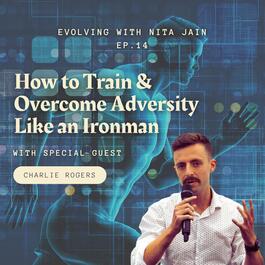
How to Train & Overcome Adversity with Ironman Athlete Charlie Rogers
In this week’s episode, writer, coach, consultant, and Ironman athlete Charlie Rogers talks about training for a triathlon, overcoming injury, maintaining an Olympic mindset, and building a portfolio career. Listen now on Apple, Spotify, Amazon Music, and YouTube. Chapter Summaries: [00:00:45] Charlie began running at the age of 14 when a coach recognized his raw talent. During his first year at university, he collapsed during a race. A cardiologist informed him that his high heart rates while running could be due to stress. [00:05:31] Biological mechanisms can help facilitate successful conditioning. Exercise creates changes in blood flow, which are detected by a protein called Piezo1. This protein then begins to remodel the vasculature in order to bring more oxygen and nutrition to your muscles, enabling them to grow and recover faster. [00:08:17] Physical exercise is necessary to keep our brains and blood vessels healthy, protect against cognitive decline, and ensure healthy longevity. Modern Western lifestyle isn't conducive to physical activity, so the onus is on us to put in the reps. [00:11:36] Charlie uses fitness trackers to record his workouts and monitor overall health. Tracking too much health data information can become overwhelming. Taking time to be present and sit in solitude can help combat data fatigue. [00:16:11] The oft-quoted goal of 10,000 steps per day has very little scientific backing and began as part of a marketing ploy for a Japanese Pedometer company in the 1960s. The typical daily step count for Charlie while training for triathlons is about 15,000. [00:19:45] We should be mindful of the risk of doing permanent bodily damage by pushing too hard during exercise. Most of us want to live longer but also maintain autonomy into later decades of life. Gaining more muscle during your 20s and 30s can help offset the 1% loss in muscle mass every year after the age of 50. [00:23:09] Charlie tracks his sleep quality using a sleep tracker on his watch but doesn't use this data to directly inform training routines. His coach, however, takes his sleep and body battery data into account. [00:28:14] Fitness trackers can be cost prohibitive and have limitations in terms of accuracy. Consumers are often faced with trade-offs between reliability and affordability. [00:31:17] The quantified self movement was born out of a desire to make sense of health data through n-of-1 experimentation. Accurately guessing our heart rates and listening to hunger cues relies on a skill called interoception, which describes our ability to sense internal signals from our bodies. We can rely on intuition while still being data-driven in our approach to health and fitness. [00:38:03] Charlie describes how he uses delayed gratification to stay motivated and push through obstacles like stomach cramps while running. Abiding by the aphorism “train hard, race easy” can help prevent lactate threshold issues. [00:42:27] Working out in a fasted state can backfire in women by blunting fat oxidation, but consuming adequate protein instead of carbohydrates before a workout can help women see more improvements in strength and lean body mass compared to post-exercise nutrition. It’s important to train with the same nutrition with which you intend to race. [00:47:00] As technology continues improving in terms of sportswear, more records will be broken. For example, Eliud Kipchoge’s shoes with carbon fiber plates allow runners to rebound faster. Accusations of doping often accompany an athlete’s rapid rise to success. [00:50:15] The gut microbiome determines how different foods and drugs are metabolized. Continuous glucose monitoring can help athletes determine which foods will keep their blood sugar levels stable and provide lasting energy. [00:54:40] Charlie has built a portfolio career as a self-employed writer, coach, and consultant. Although he’s not a professional athlete, Charlie takes his sport very seriously and invests a significant amount of time and energy into training. [00:57:33] Charlie’s Substack newsletter, Mastery in Your 20s, is a self-improvement resource detailing the business skills that one needs in order to create something meaningful in the world. Blogging a book is a great way to obtain real-time audience feedback during the writing process. [01:02:14] The Dawn of Everything dispels myths surrounding the origins of humanity and discusses the erroneous use of the “primitive” label in describing incredibly complex pre-historic societies. Connect with Charlie on LinkedIn, Strava, & Goodreads, and subscribe to his newsletter below! If you’d like to support the show, you can become a paid subscriber! The show’s theme music, “New Beginnings” by Joshua Kaye, was provided courtesy of Syfonix. This episode was recording using Riverside and edited using Descript. Some links are affiliate and help support my mission to share actionable insights with the general public at no additional cost to you. Get full access to Evolving with Nita Jain at www.nitajain.com/subscribe
From "Evolving with Nita Jain: Health | Science | Self-Development"


Comments
Add comment Feedback